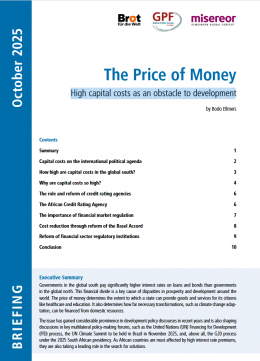Governments in the global south pay significantly higher interest rates on loans and bonds than governments in the global north. This financial divide is a key cause of disparities in prosperity and development around the world. The price of money determines the extent to which a state can provide goods and services for its citizens like healthcare and education. It also determines how far necessary transformations, such as climate change adaptation, can be financed from domestic resources.
The issue has gained considerable prominence in development policy discourses in recent years and is also shaping discussions in key multilateral policy making forums, such as the United Nations (UN) Financing for Development (FfD) process, the UN Climate Summit to be held in Brazil in November 2025, and, above all, the G20 process under the 2025 South African presidency. As African countries are most affected by high interest rate premiums, they are also taking a leading role in the search for solutions.
Numerous policy options and institutional innovations have been under discussion in recent years. Some are already being implemented. These include an African credit rating agency, which is intended to provide more accurate and, from a regional perspective, fairer ratings for African financial products. Another innovation is the African financial stability mechanism, which is designed to reduce the risk of loan defaults. Reforms of financial market regulation, in particular the Basel criteria, also have great potential. The current regulation makes loans to low income countries more expensive, especially in the infrastructure sector, due to higher capital requirements for lending institutions. Together, such reforms have the potential to significantly reduce the cost of capital for countries in the global south. Their implementation should be pursued as a matter of urgency through decisive multilateral action. Regional initiatives also warrant strong and sustained backing from the international community.
The price of money
High capital costs as an obstacle to development

